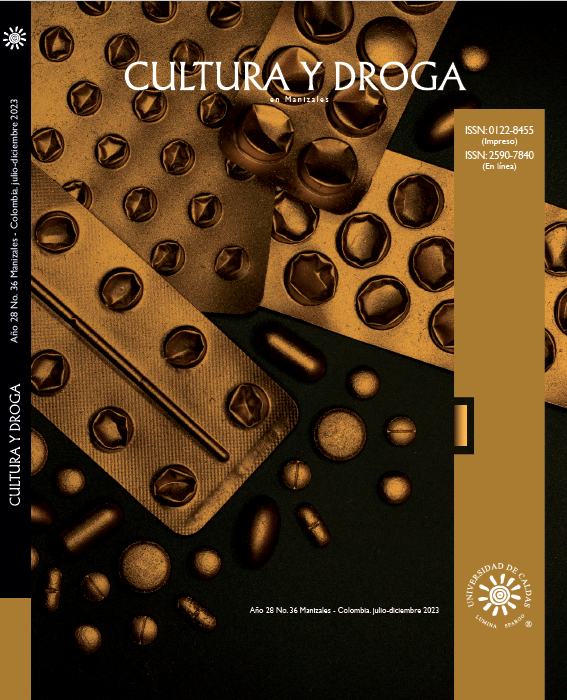Autores
Resumo
En el presente artículo, el autor analiza su trayectoria biográfica como sujeto diagnosticado con trastorno de déficit de atención con hiperactividad (TDAH) y usuario de psicofármacos prescritos para tratar la sintomatología de su diagnóstico. Para ello, toma en cuenta el periodo temporal que va desde su inserción inicial en la vida escolar –3 años– hasta su ingreso a la vida universitaria –18 años–. La autoetnografía, método narrativo diseñado a partir de la crítica a la pretensión positivista referente a la formación del conocimiento, funge como recurso metodológico directriz de la presente propuesta. Como principales resultados, el autor muestra cómo las significaciones en torno a sus conductas comienzan a variar según el contexto espaciotemporal en el que se situó dentro de la escuela y la familia. La modificación del entendimiento social de tales conductas tuvo como resultado final la patologización de las mismas en el contexto de la educación secundaria por medio de la adjudicación médica de la etiqueta diagnóstica del TDAH. De la misma forma, se contempla cómo el consumo de psicofármacos empieza configurándose como una imposición disciplinaria externa al sujeto para, finalmente, devenir como un deseo aparentemente surgido libremente. La conformación de la subjetividad del individuo, en la medida en que su trayectoria biográfica lo demuestra, termina progresivamente por estar más condicionada por el consumo de psicofármacos que por el peso simbólico de la etiqueta diagnóstica. Se concluye la necesidad de efectuar acercamientos similares que tomen en cuenta profundizar en los resultados expuestos.
Referências
Anderson, L. (2006). Analytic Autoethnography. Journal of Contemporary Ethnography, 35(4), 373-395
Bianchi, E. (2010). La perspectiva teórico-metodológica de Foucault: Algunas notas para investigar al" ADHD". Revista Latinoamericana de Ciencias Sociales, Niñez y Juventud, 8(1), 43-65. http://www.scielo.org.co/scielo.php?script=sci_arttext&pid=S1692-715X2010000100002&lng=en&tlng=es
Blanco, M. (2012). Autoetnografía: una forma narrativa de generación de conocimientos. Andamios, 9(19), 49-74.
https://www.scielo.org.mx/pdf/anda/v9n19/v9n19a4.pdf
Canguilhem, G. (1971). Lo normal y lo patológico. Siglo XXI.
Conrad, P. (2007). The medicalization of society: On the transformation of human conditions into treatable disorders. Johns Hopkins University Press.
Cornejo, G. (2011). La guerra declarada contra el niño afeminado: Una autoetnografía "queer". Iconos. Revista de Ciencias Sociales, (39), 79-95. https://www.redalyc.org/pdf/509/50918284006.pdf
Cussianovich, A. (2010). Dificultades, retos y satisfacciones: los procesos de “normalización” de niños con TDAH en Lima (tesis de licenciatura).
Pontificia Universidad Católica de Perú.
De la Peña, F., Palacio, J. y Barragán, E. (2010). Declaración de Cartagena para el Trastorno de Déficit de Atención con Hiperactividad (TDAH):
rompiendo el estigma. Revista Ciencias de la Salud, (8), 93-98.
Deleuze, G. y Guattari, F. (2002). Mil Mesetas. Capitalismo y Esquizofrenia. PreTextos.
Douglas, M. (1983). How Institutions Think. Syracuse University Press.
Ellis, C., Adams, T.E. y Bochner, A.P. (2011). Autoethnography: an overview.Historical social research/Historische sozialforschung, 273-290.
https://www.jstor.org/stable/23032294
Filipe, A.M. (2016). Making ADHD Evident: Data, Practices, and Diagnostic Protocols in Portugal. Medical Anthropology, 35(5), 390-403.
https://doi.org/10.1080/01459740.2015.1101102
Foucault, M. (2009). Vigilar y castigar: nacimiento de la prisión. Siglo XXI.
Foucault, M. (1988). Technologies of the self. En Martin, L., Gutman, H. y Huttonm,P. (Eds.). Technologies of the Self. A seminar with Michel Foucault (pp. 16-49).The University of Massachusetts Press.
Fricker, M. (2007). Epistemic injustice: power and the ethics of knowing. Oxford University Press.
Gariglio, L. y Ellis, C. (2018). «Good ethnography is autoethnographic, and good autoethnography is ethnographic». A dialogue with Carolyn Ellis. Rassegna Italiana di Sociologia, 59(3), 555-580. DOI:10.1423/91084
Goffman, E. (2021). Estigma: La identidad deteriorada. Amorrortu.
Hacking, I. (1998). Mad Travellers: Reflections on the Reality of Transient Illnesses.University Press of Virginia.
Hoben, J. y Hesson, J. (2021). Invisible lives: Using autoethnography to explore the experiences of academics living with attention deficit hyperactivity disorder (ADHD). New Horizons in Adult Education and Human Resource Development,33(1), 37-50.
Jutel, A. y Nettleton, S. (2011). Towards a sociology of diagnosis: Reflections and opportunities. Social Science & Medicine, 73(6) 793-800.
doi: 10.1016/j.socscimed.2011.07.014
Ing, C. y Mills, J.P. (2017). “Hey, look at me”: An {auto}ethnographic account of experiencing ADHD symptoms within sport. Qualitative Research in Sport, Exercise and Health, 1-10. doi:10.1080/2159676x.2017.1405362
Iriart, C. (2008). Capital financiero versus complejo médico-industrial: los desafíos de las agencias regulatorias. Cienc. Saude Colet., 13(5), 1619-1626.
Latour, B. y Wooglar, S. (2013). Laboratory Life. The Construction of Scientific Facts. Princeton University Press.
Leavy, P. (2013). "¿Trastorno o mala educación?" Reflexiones desde la antropología de la niñez sobre un caso de TDAH en el ámbito escolar.
Revista Latinoamericana de Ciencias Sociales, Niñez y Juventud, 11(2), 675-688. doi:10.11600/1692715x.11215101012
Metzger, A.N. y Hamilton, L.T. (2021). The stigma of ADHD: teacher ratings of labeled students. Sociological Perspectives, 64(2), 258-279.
Preciado, P.B. (2008). Testo Yonqui. Espasa Calpe.
Rafalovich, A. (2005) Exploring clinician uncertainty in the diagnosis and treatment of attention deficit hyperactivity disorder. Sociology of
Health & Illness, 27, 305-23. doi: 10.1111/j.1467-9566.2005.00444.x
Rassoul, R. (2021). A Life of Ambivalence: Exploring ADHD through Autoethnography (tesis doctoral). American University of Lebanon.
Rodas-Gómez, A.M. (2021). Reflexiones autoetnográficas sobre el uso de heroína en Colombia y su relación con los mundos delictivos. Revista Cultura y Droga, 26(32), 137-151. https://doi.org/10.17151/culdr.2021.26.32.7
Rose, N. (2012). Políticas de la vida. Biomedicina, poder y subjetividad en el siglo XXI. UNIPE.
Strand, M. (2011). Where do classifications come from? The DSM-III, the transformation of American psychiatry, and the problem of origins in the sociology of knowledge. Theory and Society, 40(3), 273-313. https://doi.org/10.1007/s11186-011-9142-8
Wall, S. (2006). An Autoethnography on Learning about Autoethnography.International Journal of Qualitative Methods, 5(2), 146-160.
doi:10.1177/160940690600500205
Wall, S. (2016). Toward a moderate autoethnography. International Journal of Qualitative Methods, 15(1), 1-9.

 PDF (Español)
PDF (Español)
 FLIP
FLIP






















